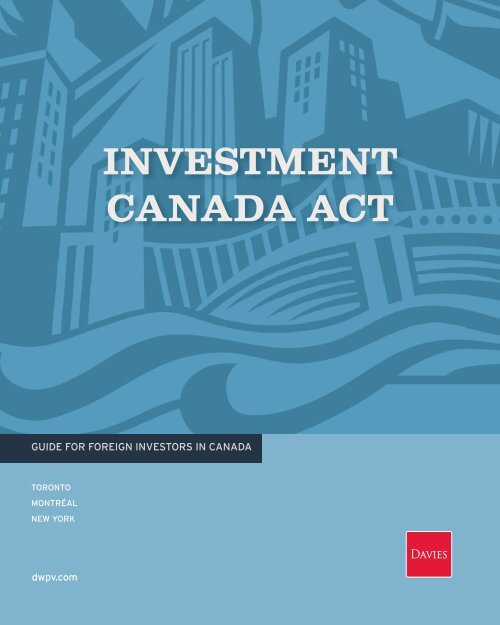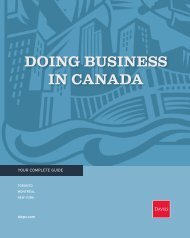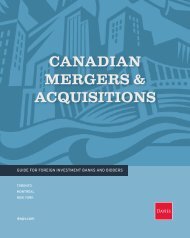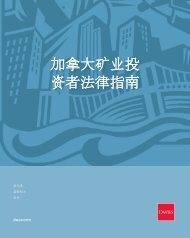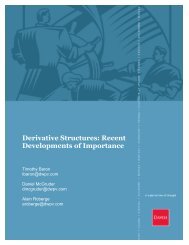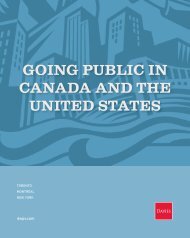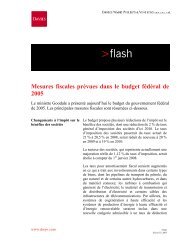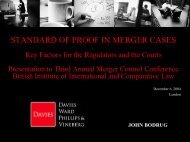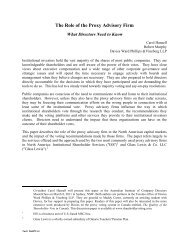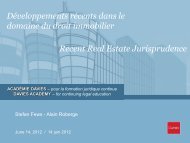INVESTMENT CANADA ACT - Davies Ward Phillips & Vineberg LLP
INVESTMENT CANADA ACT - Davies Ward Phillips & Vineberg LLP
INVESTMENT CANADA ACT - Davies Ward Phillips & Vineberg LLP
- No tags were found...
Create successful ePaper yourself
Turn your PDF publications into a flip-book with our unique Google optimized e-Paper software.
<strong>INVESTMENT</strong><strong>CANADA</strong> <strong>ACT</strong>GUIDE FOR FOREIGN INVESTORS IN <strong>CANADA</strong>TORONTOMONTRÉALNEW YORKdwpv.com
If you are interested in receiving more information on <strong>Davies</strong> <strong>Ward</strong> <strong>Phillips</strong> & <strong>Vineberg</strong>, please contact us or visitour website at www.dwpv.com.Investment Canada Act: Guide for Foreign Investors in Canada, 1st editionIf you are interested in receiving additional information regarding the Investment Canada Act or otherlegislation regulating foreign investment in Canada, please contact:Toronto George Addy Tel.: 416.863.5588 Email: gaddy@dwpv.comAnita Banicevic Tel.: 416.863.5523 Email: abanicevic@dwpv.comJohn Bodrug Tel.: 416.863.5576 Email: jbodrug@dwpv.comRichard Elliott Tel.: 416.863.5506 Email: relliott@dwpv.comAdam Fanaki Tel: 416.863.5564 Email: afanaki@dwpv.comMark Katz Tel.: 416.863.5578 Email: mkatz@dwpv.comMontréal Hillel Rosen Tel.: 514.841.6443 Email: hrosen@dwpv.com
ONTENTSTABLE OF CONTENTSINTRODUCTION 1APPLICATION OF THE ICA 3THRESHOLDS FOR REVIEW 7"NET BENEFIT" TEST 11THE REVIEW PROCESS 13UNDERTAKINGS 15PROHIBITIONS AND REMEDIES 17STATE-OWNED ENTERPRISES 19NATIONAL SECURITY REVIEW 21APPENDIX A - WORLD TRADE ORGANIZATION MEMBERCOUNTRIES23Table of Contentsii
1IntroductionIndustrial and Intellectual Property 22
IntroductionForeign investments in Canada are subject to the federal Investment Canada Act (the "ICA"). 1 The purpose ofthe ICA is to encourage foreign investment in Canada while at the same time ensuring that foreign investmentcontributes to economic growth and employment opportunities. In addition, amendments in March 2009provide that the ICA now has the further purpose of protecting national security by providing for the review offoreign investments in Canada that could be injurious to national security.The principal responsibility for enforcing the ICA belongs to the federal Minister of Industry; 2 investments in"cultural businesses" are the responsibility of the federal Minister of Canadian Heritage (collectively, the"Responsible Minister"). 3Foreign investors whose acquisitions are subject to review under the ICA must satisfy the Responsible Ministerthat the acquisition is likely to be of "net benefit to Canada". 4 Acquisitions are rarely refused approval underthe "net benefit" test, although the only two rejections of proposed acquisitions in non-cultural sectors occurredrecently – one in 2008 and the other in 2010. 5 However, the ICA review process can introduce delay into thetransaction timetable. 6 In addition, foreign investors are usually obliged to provide binding undertakings to theResponsible Minister in order to obtain approval. These can involve commitments to undertake capitalexpenditures, maintain certain employment levels and ensure Canadian participation in management of thebusiness, among other things. 7In addition to this general "net benefit to Canada" review process, amendments to the ICA in March 2009 nowgive the Responsible Minister, and ultimately the federal Cabinet, broad discretion to review investments ongrounds that they could be injurious to national security. Where an investment (whether completed orproposed) is found to be injurious to national security, the federal Cabinet has authority to block, in whole or inpart, the investment (including ordering divestiture where the investment is already completed) or imposeconditions on the investment.The ICA has been subjected to criticism both by those who believe it is too lax in controlling foreign investmentsand by those who believe that it represents too great of an impediment to foreign investment. One issue ofdebate has revolved around the treatment of "State-Owned Enterprises" ("SOEs"). As a result, there are nowspecific guidelines governing investments in Canada by foreign-owned SOEs. 81 R.S. 1985, c. 28 (1st Supp.). Although beyond the scope of this booklet, there are also sector-specific rules governing foreigninvestments in certain key industries, such as telecommunications, broadcasting, airlines and banking.2 The Investment Review Branch ("IRB") is the specific part of Industry Canada charged with administering the ICA.3 The definition of "cultural business" is provided in the Thresholds for Review section of this guide. The Cultural Sector InvestmentReview division is the counterpart of the IRB in Heritage Canada.4 The "net benefit" test is discussed in more detail in the “Net Benefit” Test section of this guide.5 In 2008, the Minister of Industry denied approval of the proposed $1.325 billion acquisition by Alliant Techsystems Inc. of the spacedivision of MacDonald, Detwiller and Associates Ltd. In 2010, the Minister of Industry announced that BHP Billiton's proposed $38billion acquisition of Potash Corporation of Saskatchewan Inc. was not likely to be of net benefit to Canada. (BHP Billiton subsequentlyabandoned the transaction during the 30 day "appeal" period during which BHP Billiton could submit additional representations andundertakings.) These are the only two non-cultural acquisitions to be turned down since the ICA came into force in 1985.6 The timing of the ICA review process is discussed in more detail in the Review Process section of this guide.7 "Undertakings" are discussed in more detail in the Undertakings section of this guide.8 The SOE guidelines are discussed in more detail in the State-Owned Enterprises section of this guide.2 Introduction
3Applicationof the ICAIndustrial and Intellectual Property 22
Application of the ICAThe ICA applies whenever a "non-Canadian" (i) establishes a new "Canadian business" or (ii) acquires "control"of an existing "Canadian business". Also, as discussed in the National Security Review section of this guide,there is now scope to review an investment under the ICA on national security grounds even where there hasnot been an acquisition of "control" of a "Canadian business"."NON-CANADIAN"A "non-Canadian" is defined under the ICA as an individual, entity, government or government agency that isnot "Canadian".The ICA rules governing who/what is a "Canadian" (and therefore who/what is a "non-Canadian") can becomplex. Briefly, however, an individual is a "Canadian" for the purposes of the ICA if he or she is a Canadiancitizen or a permanent resident of Canada who has been ordinarily resident in Canada for not more than oneyear after first becoming eligible to apply for Canadian citizenship. (Permanent residents may apply forCanadian citizenship after three years in Canada.)A corporation is a "Canadian" if the ultimate controlling shareholders are "Canadian". In the case of widely-heldcompanies, it may be practically impossible to determine whether shareholders are "Canadian". Accordingly,the test for widely held companies is based on the citizenship or permanent resident status of the members ofthe company's board of directors. If at least 2/3 of the board is comprised of "Canadian" individuals, and thecompany is not controlled in fact through the ownership of its shares, the corporation will be considered"Canadian"; if not, the corporation is "non-Canadian". (There are similar "status" rules for partnerships andtrusts.)"CANADIAN BUSINESS"The term "Canadian business" is defined in the ICA to mean a business carried on in Canada that has (i) a placeof business in Canada, (ii) an individual or individuals in Canada who are employed or self-employed inconnection with the business, and (iii) assets in Canada used in carrying on the business. Note that a "Canadianbusiness" need not be controlled by Canadians – the acquisition of a foreign-controlled business operating inCanada is also subject to the ICA. In addition, a business need not be carried on entirely in Canada to qualify as"Canadian"."Business" is defined to include any undertaking or enterprise capable of generating revenue and carried on inanticipation of profit. Thus, for example, an enterprise that is carried on for a charitable or other non-profitobjective is not a "business" for these purposes.An entity that is in a "pre-operational state" because of the lack of an essential asset or the source of supply ormanpower is also not considered a "business" for these purposes. Consequently, an oil and gas property that isonly at the exploration stage is not considered a "business" under the ICA. However, an oil and gas propertythat contains recoverable reserves which is capable of production (or is already in production) will be treated asa "business". Similarly, mineral properties which are only at the exploration stage are not considered to be"businesses". However, a producing mine is considered to be a "business" as is a property on whichdevelopment of a mine has been commenced for the purpose of production.4 Application of the ICA
ACQUISITION OF "CONTROL"The ICA includes detailed provisions defining the concept of an "acquisition of control". In summary, theseprovisions state that control can be acquired only through the acquisition of (i) voting shares of a corporation,(ii) "voting interests" of a non-corporate entity (which for partnerships and trusts means an ownership interestin the assets thereof that entitle the owner to receive a share of the profits and to share in the assets ondissolution), or (iii) all or substantially all of the assets of a Canadian business. Note that the acquisition ofshares of a non-Canadian company with a Canadian division, but no Canadian subsidiaries, is not an "acquisitionof control" of a Canadian business within the meaning of the ICA.For the purposes of determining whether an investor has acquired "control" of a corporation, the followinggeneral presumptions apply:• the acquisition of a majority of voting shares is deemed to be an acquisition of control;• the acquisition of one-third or more but less than a majority of voting shares is presumed to be anacquisition of control, unless it can be shown that the acquired shares do not give the investor "controlin fact" over the corporation; and• the acquisition of less than one-third of the voting shares is deemed not to be an acquisition of control.Similarly, for the purposes of determining whether an investor has acquired control of a non-corporate entity,the following general presumptions apply:• the acquisition of a majority of voting interests is deemed to be an acquisition of control; and• the acquisition of less than a majority of voting interests is deemed not to be an acquisition of control.Because of the unique sensitivities attached to "cultural businesses" in Canada, the Minister of CanadianHeritage may deem there to have been an acquisition of "control" of a Canadian cultural business even if thegeneral criteria for establishing "control" are not met.EXEMPTIONSThe ICA contains several exemptions that preclude its application.For example, the ICA does not apply to corporate reorganizations where the foreign party that ultimatelycontrols the Canadian business in fact does not change.The ICA also does not govern certain transactions to which the federal Bank Act applies.Application of the ICA 5
7Thresholdsfor ReviewIndustrial and Intellectual Property 22
Thresholds for ReviewAcquisitions are subject to review under the ICA if they exceed certain prescribed financial thresholds. If therelevant thresholds are not exceeded, then the only requirement on the foreign investor is to submit anotification containing basic information within 30 days of closing. (However, even where the review thresholdsare not exceeded, see the National Security Review section of this guide, for the possibility of ICA review onnational security grounds.) Investments to establish a new Canadian business (other than a "cultural business")are not subject to review – the only requirement is to submit a notification.The thresholds for review vary depending upon several considerations, including:• Is the foreign investor, or the Canadian business being acquired, ultimately controlled by "WTOInvestors"?• Is the acquisition of control "direct" or "indirect"?• Is the Canadian business a "cultural business"?"WTO INVESTORS"The definition of a "WTO Investor" under the ICA is complex. In general, an individual will be a "WTO Investor" ifhe/she is a "national" of a country (other than Canada) that is a member of the World Trade Organization("WTO") or has a right of permanent residence in a WTO member country. 9 A corporation or other entity will bea "WTO Investor" if it, in turn, is ultimately controlled by one or more "WTO Investors". A widely-held publiccompany will generally be a "WTO Investor" for the purposes of the ICA (i) if it can be established that a majorityof the voting shares of the public company is owned by WTO Investors or (ii) where no person or voting groupcontrols the company, at least two-thirds of the members of the company's board of directors are anycombination of WTO Investors and Canadians."INDIRECT ACQUISITION"Generally speaking, an "indirect acquisition" for the purposes of the ICA occurs where the investor is acquiringcontrol of a corporation incorporated elsewhere than in Canada that controls an entity in Canada carrying on aCanadian business."CULTURAL BUSINESS"The acquisition of a Canadian business that is a "cultural business" is subject to lower review thresholds underthe ICA because of the perceived sensitivity of the cultural sector. A "cultural business" includes a business thatcarries on any of the following activities: (i) publication, distribution or sale of books, magazines, periodicals ornewspapers in print or machine readable form, other than the sole activity of printing or typesetting; (ii)production, distribution, sale or exhibition of film or video products; (iii) production, distribution, sale orexhibition of audio or video music recordings; (iv) publication, distribution or sale of music in print or machinereadable form; or, for some purposes (v) any radio communication in which the transmissions are intended for9 A list of WTO Member countries as of the date of writing is attached hereto as Appendix A.8 Thresholds for Review
direct reception by the general public, any radio, television and cable television broadcasting undertakings andany satellite programming and broadcast network services.APPLICABLE REVIEW THRESHOLDSSummarized briefly, an acquisition of a Canadian business that exceeds the following thresholds will be subjectto review under the ICA:(i) Where either the acquiring party is a "WTO Investor" or the Canadian business being acquired iscontrolled by a "WTO Investor":• A direct acquisition will be reviewable only when the value of the assets of the entity carrying on theCanadian business and all other entities in Canada, the control of which is being acquired (i.e., notlimited to assets in Canada), is equal to or greater than the threshold for review for WTO Investors.That threshold is currently $312 million (Cdn.) in book value of assets unless the Canadian business is acultural business, in which case the threshold is $5 million (Cdn.) in book value of assets. However,pursuant to amendments enacted on March 12, 2009 and to come into effect on a date to bedetermined by the federal Cabinet (expected shortly), the threshold for review of direct acquisitions ofa Canadian business that is not a cultural business will change such that review will be required if the"enterprise value" (to be defined by forthcoming regulations) of the assets of the Canadian business isequal to or greater than (a) $600 million (Cdn.), in the case of investments made during the first twoyears after the thresholds come into force; (b) $800 million (Cdn.), in the case of investments madeduring the third and fourth years after the thresholds come into force; and (c) $1 billion (Cdn.), in thecase of investments made between the fifth year after the thresholds come into force and December31 of the sixth year after the thresholds come into force. This threshold will thereafter be adjusted onan annual basis. These changes will not affect the threshold applicable to acquisitions of a culturalbusiness;• an "indirect" acquisition by or from a WTO Investor will not be reviewable but will be subject tonotification only, unless the Canadian business is a cultural business and the relevant asset valueexceeds $50 million (Cdn.), in which case a review obligation would apply.(ii)Where no "WTO Investor" is involved as the acquiring party or vendor:• a "direct" acquisition will be reviewable if the value of the relevant assets involved exceeds $5 million(Cdn.);• an "indirect" acquisition will be reviewable if the value of the relevant assets involved exceeds $50million (Cdn.).Some additional points should be noted in this regard:• There is no de minimis exception to the determination of whether a business is a cultural business.• A business will be considered a cultural business even if its cultural activities represent only a smallpart of its overall operations.• The Minister of Canadian Heritage may decide to review the acquisition of control over certainCanadian cultural businesses even if the acquisition does not trigger any of the foregoing thresholds.Thresholds for Review 9
11"Net Benefit"TestIndustrial and Intellectual Property 22
"Net Benefit" TestCRITERIAAmong the relevant factors that the Responsible Minister will assess in determining "net benefit" are thefollowing:• Economic Activity: The investor is required to explain the effect of the investment on the level andnature of economic activity in Canada, including the effect of the investment on employment, resourceprocessing, and the utilization of parts, components and services produced in Canada. The number ofjobs to be created (or lost) in Canada will be an important consideration, as will any incrementalinvestment over existing levels.• Canadian Participation: The investor is required to describe the degree and significance of continuedparticipation by Canadians in the Canadian business, for example, whether (and how many) Canadianswill act as directors and managers of the acquired entity, or whether equity will be made available toCanadian employees through a stock option plan.• Competition/Productivity: The investor is required to explain the effect of the investment oncompetition in Canada, as well as on factors such as (i) productivity, (ii) industrial efficiency, (iii)technological development, and (iv) product innovation and product variety. As a general rule,Canada's Competition Bureau will be asked for its views in this regard.• National and International Impact: The investor is required to address the compatibility of theinvestment with "national industrial, economic and cultural policies", which include both federal policyobjectives as well as those of any government or legislature of a province likely to be significantlyaffected by the investment. The investment also will be assessed in light of its contribution toCanada's ability to compete in world markets.SECTORSThere are specific policies setting out how the "net benefit" test will be applied to certain sectors, including bookpublishing and film production and distribution. In some cases, there is an absolute prohibition on foreigninvestments regardless of the benefits offered. For example, one such policy states that non-Canadians may notacquire Canadian owned and controlled film or book distribution businesses (although they may acquireCanadian businesses in these sectors from other non-Canadians). However, exceptions have been made to someof these policies.NATIONAL SECURITYIn addition to the foregoing criteria for a "net benefit" review, there is now, pursuant to amendments enacted inMarch 2009, broad discretion under the ICA to review investments – whether or not subject to a "net benefit"review – on grounds of national security. See the National Security Review section of this guide.12 “Net Benefit Test”
13The ReviewProcessIndustrial and Intellectual Property 22
The Review ProcessAPPLICATION FOR REVIEWThe ICA review process requires the submission of an application form that sets out information about theinvestor and the Canadian business being acquired. The most substantive portion of the application is wherethe investor sets out its plans for the Canadian business and explains why its investment is of net benefit toCanada.There is no formal avenue for interested parties to intervene in this review process. However, federal ministrieswith a potential interest in the transaction will be consulted as will each of the provinces in which the Canadianbusiness has at least 10 employees. The province of Québec has been the most active participant in this latterprocess and will often seek undertakings to benefit employees, suppliers and economic activity in that province.Other provinces have historically become involved only sporadically (e.g., if a key industry is at issue), althoughthere are signs that they may now be taking on a greater role. 10TIMINGThe Responsible Minister has 45 days following receipt of a completed application for review to either approveor deny the application. If the Responsible Minister's review is not completed by then, the Minister has theunilateral authority to extend the review period for a further 30 days (for a total of 75 days from the start of theprocess). If the Responsible Minister still requires more time at the end of that period, the Investor's consentmust be obtained for any further extension (which has no set limit).Where the Responsible Minister has advised the applicant that he is not satisfied that the investment is likely tobe of net benefit to Canada, the applicant has the right to make representations and submit undertakings within30 days of the date of the notice of the Responsible Minister's decision (or any longer period that may benegotiated).Most transactions are reviewed within the initial 45-day period (or perhaps a slightly extended period beyondthat), although there are cases involving particularly sensitive transactions where the review process tookseveral months to complete.In the case of transaction which are also subject to a national security review, the Responsible Minister has untilfive days following the expiry of the notice period under the national security review to complete his review.PRE- OR POST-CLOSINGA key consideration for investors in terms of timing is whether the "net benefit" review is to take place before orafter closing. In the case of "direct" acquisitions, investors are generally obliged to submit their applications forreview and obtain the Responsible Minister's approval before they may complete the acquisition. In contrast,the review process for "indirect" acquisitions takes place following closing (although investors are entitled to fileprior to closing should they choose to do so).10 The province of Saskatchewan was actively involved in the recent review of BHP Billiton's proposed $38 billion acquisition of PotashCorporation of Saskatchewan Inc.14 The Review Process
Undertakings15
UndertakingsThe Responsible Minister usually requires investors to provide undertakings as a condition for approval.Undertakings generally extend for 3-5 years and typically involve commitments with respect to matters such as:• capital expenditures;• investment in research and development;• minimum employment levels;• Canadian participation in management or as directors;• processing resource products in Canada;• transferring technology to Canada;• location of the head office;• purchases from Canadian suppliers; and• where cultural businesses are involved, various types of support (usually financial) for the "Canadiancultural community".More recently, the Responsible Minister has sought undertakings to continue to list the acquired Canadianbusinesses on a Canadian stock exchange.16 Undertakings
Prohibitionsand Remedies17
Prohibitions and RemediesThe Responsible Minister may seek to impose sanctions on non-Canadian investors in the event of noncompliancewith the ICA. Examples of non-compliance include if the investor (i) fails to file a requirednotification or application for review, (ii) implements an investment without the necessary approval or that hasbeen prohibited, (iii) does not divest as required, or (iv) does not comply with an undertaking. Where there is anissue of compliance with an undertaking, the ICA provides for the possibility of the Responsible Ministeraccepting a new or "replacement" undertaking.Available sanctions include compulsory divestiture; revocation or suspension of voting rights; and potentiallysignificant financial penalties (not exceeding $10,000 (Cdn.) for each day the non-Canadian is in breach of theICA). It should be noted, however, that sanctions for non-compliance have rarely, if ever, been resorted to inpractice.18 Prohibitions and Remedies
State-OwnedEnterprises19
State-Owned Enterprises (SOEs)On December 7, 2007, Canada's Minister of Industry released guidelines under the ICA applicable to acquisitionsof Canadian businesses by foreign SOEs.The SOE Guidelines are intended to address the Canadian government's main concern about foreign SOEinvestment in Canada, namely that they should operate according to sound principles of corporate governanceand commercial orientation. Thus, the SOE Guidelines provide that the Minister of Industry will examine thecorporate governance and reporting structures of foreign SOEs as part of the assessment process under theICA. This will involve assessing factors such as the extent and nature of state control over the SOE and whetherthe SOE adheres to Canadian standards of corporate governance (such as a commitment to transparency anddisclosure and to the independence of board and audit committee members).The Minister of Industry also will assess whether the acquired Canadian business will continue to operate on acommercial basis under the SOE's ownership (e.g., with respect to where the Canadian business will process andexport its products). In addition, the Minister will look at factors such as the impact of the investment onCanadian participation in the business, capital expenditures and support for ongoing research and development.(These are standard criteria for review under the ICA.)The SOE Guidelines also encourage foreign SOEs to submit draft undertakings as part of the materials they filein support of their proposed acquisitions. Examples of undertakings that could be appropriate in this contextinclude: (i) the appointment of Canadians as independent directors on the SOE's board of directors; (ii) theemployment of Canadians in senior management positions; and (iii) the listing of securities of the acquiredbusiness on a Canadian stock exchange. (Again, it is not unusual for the Minister to seek these commitmentseven when SOEs are not involved.)The SOE Guidelines are not designed to discourage investment by foreign SOEs in Canada. Rather, they aremeant to deal with the rare case in which closer scrutiny may be required. The SOE Guidelines thus represent arefinement to the ICA review process but are not intended to introduce a significant obstacle to the flow ofinvestment into Canada by non-Canadians.20 State-Owned Enterprises
National SecurityReview21
National Security ReviewIrrespective of whether an investment is subject to a "net benefit to Canada" review, the ICA provides for thereview of investments that "could be injurious to national security".Under this process, Cabinet may, on the recommendation of the Minister, order a national security review. IfCabinet orders a review, the Minister is required to send a notice to the investor that the investment will bereviewed, and the proposed transaction cannot be completed while the review is pending. If the transaction hasalready been completed, a review can still be ordered (and remedies, including divestiture of the Canadianbusiness, can still be required) following implementation of the transaction.The expression "national security" is not defined and there are no monetary thresholds that must be exceededto trigger a national security review. Moreover, the general "net benefit" review threshold requirement thatthere be an "acquisition of control" of a "Canadian business" has been relaxed such that a national securityreview could occur where there has been an acquisition "in whole or in part" of "an entity carrying on all or anypart of its operations in Canada, if the entity has (i) a place of operations in Canada; (ii) an individual orindividuals in Canada who are employed or self-employed in connection with the entity's operations, or (iii)assets in Canada used in carrying on the entity's operations.The national security review is carried out by the Minister in consultation with the Minister of Public Safety andEmergency Preparedness. The Minister has until 45 days following the filing of a notification or an applicationfor review, or until 45 days following implementation of a transaction not subject to notification or review, toissue a notice to a non-Canadian that its proposed investment may be subject to a national security review. Theentire review process can take up to 130 days.Alternatively, the federal Cabinet can order a national security review within 45 days of the filing of anotification or an application for review, or within 45 days of implementation of a transaction not subject tonotification or review, without a notice of possible review first being issued. If this occurs, the entire nationalsecurity review process can take up to 105 days.If, following the review, the Minister is satisfied that the investment would be injurious to national security, thenthe Federal Cabinet is authorized to take any measures that it considers advisable to protect national security,including imposing conditions on the investment or the outright prohibition of a proposed investment (ordivestiture in the case of a completed investment).22 National Security Review
Appendix A:World Trade OrganizationMember Countries23
APPENDIX AAlbaniaAngolaAntigua and BarbudaArgentinaArmeniaAustraliaAustriaBahrain, Kingdom ofBangladeshBarbadosBelgiumBelizeBeninBoliviaBotswanaBrazilBrunei DarussalamBulgariaBurkina FasoBurundiCambodiaCameroonCanadaCape VerdeCentral African RepublicChadChileChinaColombiaCongoCosta RicaCôte d'IvoireCroatiaCubaCyprusCzech RepublicDemocratic Republic ofthe CongoDenmarkDjiboutiDominicaWORLD TRADE ORGANIZATION MEMBER COUNTRIES(Verified as of May 12, 2010)Dominican RepublicEcuadorEgyptEl SalvadorEstoniaEuropean UnionFijiFinlandFormer Yugoslav Republicof MacedoniaFranceGabonThe GambiaGeorgiaGermanyGhanaGreeceGrenadaGuatemalaGuineaGuinea BissauGuyanaHaitiHondurasHong Kong, ChinaHungaryIcelandIndiaIndonesiaIrelandIsraelItalyJamaicaJapanJordanKenyaKorea, Republic ofKuwaitKyrgyz RepublicLatviaLesothoLiechtensteinLithuaniaLuxembourgMacao, ChinaMadagascarMalawiMalaysiaMaldivesMaliMaltaMauritaniaMauritiusMexicoMoldovaMongoliaMoroccoMozambiqueMyanmarNamibiaNepalNetherlands – For theKingdom in Europe &for the NetherlandsAntillesNew ZealandNicaraguaNigerNigeriaNorwayOmanPakistanPanamaPapua New GuineaParaguayPeruPhilippinesPolandPortugalQatarRomaniaRwandaSaint Kitts & NevisSaint LuciaSaint Vincent & theGrenadinesSaudi ArabiaSenegalSierra LeoneSingaporeSlovak RepublicSloveniaSolomon IslandsSouth AfricaSpainSri LankaSurinameSwazilandSwedenSwitzerlandChinese TaipeiTanzaniaThailandTogoTongaTrinidad and TobagoTunisiaTurkeyUgandaUkraineUnited Arab EmiratesUnited KingdomUnited States of AmericaUruguayVenezuela (BolivarianRepublic of)Viet NamZambiaZimbabwe24 Appendix A: World Trade Organization Member Countries
TORONTODAVIES WARD PHILLIPS & VINEBERG <strong>LLP</strong>1 FIRST CANADIAN PLACE 44TH FLOORTORONTO ON <strong>CANADA</strong> M5X 1B1TELEPHONE: 416.863.0900FAX: 416.863.0871MONTRÉALDAVIES WARD PHILLIPS & VINEBERG <strong>LLP</strong>1501 MCGILL COLLEGE AVENUE 26TH FLOORMONTRÉAL QC <strong>CANADA</strong> H3A 3N9TELEPHONE: 514.841.6400FAX: 514.841.6499NEW YORKDAVIES WARD PHILLIPS & VINEBERG <strong>LLP</strong>625 MADISON AVENUE 12TH FLOORNEW YORK NY U.S.A. 10022TELEPHONE: 212.588.5500FAX: 212.308.0132A superior line of thoughtdwpv.com


